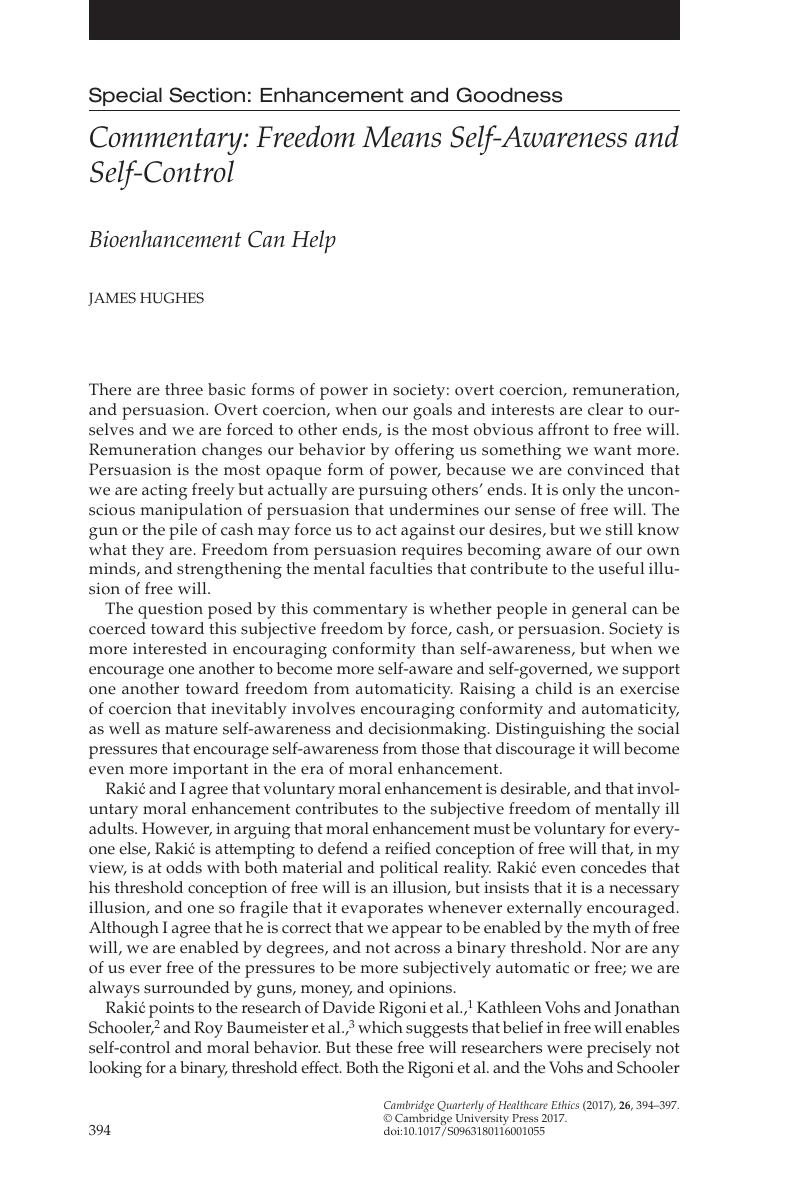No CrossRef data available.
Published online by Cambridge University Press: 25 May 2017

1. Rigoni, D, Kühn, S, Gaudino, G, Sartori, G, Brass, M. Reducing self-control by weakening belief in free will. Consciousness and Cognition 2012;21:1482–90.CrossRefGoogle ScholarPubMed
2. Vohs, KD, Schooler, JW. The value of believing in free will: Encouraging a Belief in determinism increases cheating. Psychological Science 2008;19:49–54.CrossRefGoogle ScholarPubMed
3. Baumeister, RF, Crescioni, AW, Alquist, JL. Free will as advanced action control for human social life and culture. Neuroethics 2011;4:1–11.CrossRefGoogle Scholar
4. Cave S. Free will is back, and maybe we can measure it: Like IQ or EQ there should be FQ: A freedom quotient to show how much free will we have – and how to get more. Aeon 2015.
5. Schaefer, GS, Kahane, G, Savulescu, J. Autonomy and enhancement. Neuroethics 2014;7(2):123–36.CrossRefGoogle ScholarPubMed
6. Battledaya, RM, Brema, AK. Modafinil for cognitive neuroenhancement in healthy non-sleep-deprived subjects: A systematic review. European Neuropsychopharmacology 2015;25:1865–81.CrossRefGoogle Scholar
7. Coghilla, DR, Setha, S, Pedrosoc, S, Usalad, T, Curriea, J, Gaglianoe, A. Effects of methylphenidate on cognitive functions in children and adolescents with attention-deficit/hyperactivity disorder: Evidence from a systematic review and a meta-analysis. Biological Psychiatry 2014;76(8):603–14.CrossRefGoogle Scholar
8. Chorniy A, Kitashima L. Sex, drugs, and ADHD: The effects of ADHD pharmacological treatment on teens’ risky behaviors. Labour Economics 2016;43:87–105.
9. Singh, I. Not robots: Children’s perspectives on authenticity, moral agency and stimulant drug treatments. Journal of Medical Ethics 2012:39(6):1–8.Google ScholarPubMed
10. Pugh, J. Enhancing autonomy by reducing impulsivity: The case of ADHD. Neuroethics 2014;7:373–5.CrossRefGoogle Scholar
11. Rourke, P, Howard, J, Martire, KA. Legal mandates and perceived coercion in residential alcohol and other drug treatment. psychiatry, Psychology and Law 2015;22(5):756–78.CrossRefGoogle Scholar
12. Koehler, JA, Humphreys, DK, Akoensi, TD, de Ribera, OS, Losel, F. A systematic review and meta-analysis on the effects of European drug treatment programmes on reoffending. Psychology, Crime and Law 2014;20(6):584–602.CrossRefGoogle Scholar
13. Caplan, A. Denying autonomy in order to create it: The paradox of forcing treatment upon addicts. Addiction 2008;103(12):1919–21.Google ScholarPubMed
14. Lai, CK et al. Reducing Implicit Racial Preferences: I. A comparative investigation of 17 interventions. Journal of Experimental Psychology 2014;143:1765–85.CrossRefGoogle ScholarPubMed
15. Terbeck, S, Kahane, G, McTavish, S, Savulescu, J, Cowen, PJ, Hewstone, M. Propranolol reduces implicit negative racial bias. Psychopharmacology 2012;222:419–24.CrossRefGoogle ScholarPubMed
16. Lueke, A, Gibson, B. Mindfulness meditation reduces implicit age and race bias: The role of reduced automaticity of responding. Social Psychological and Personality Science 2014;6(3):284–91.CrossRefGoogle Scholar
17. Hughes, JJ. Moral enhancement requires multiple virtues: Toward a posthuman model of character development. Cambridge Quarterly of Healthcare Ethics 2015:24(1):86–95.CrossRefGoogle Scholar
18. Shaw, E. Direct brain interventions and responsibility enhancement. Criminal Law and Philosophy 2014;8:1–20.CrossRefGoogle Scholar